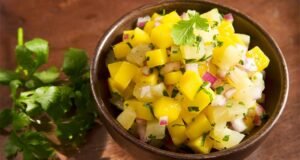 Do you like salad? You’re a fool. Not because bacon is better (although, of course, it is) but because salad vegetables are nutrition-lite, resource-guzzling, pseudo-healthy food crimes that enable the overconsumption of blue cheese dressing. If they aren’t bringing foodborne diseases to your table, they are being chucked, soggily, into the bin. Tamar Haspel, the Washington Post’s food columnist, made properly considered and intelligent versions of all these points yesterday, leading us to wonder what life would be like if we, as she suggests, started to think of salad as a resource-hungry luxury, rather than a wholesome staple.
Do you like salad? You’re a fool. Not because bacon is better (although, of course, it is) but because salad vegetables are nutrition-lite, resource-guzzling, pseudo-healthy food crimes that enable the overconsumption of blue cheese dressing. If they aren’t bringing foodborne diseases to your table, they are being chucked, soggily, into the bin. Tamar Haspel, the Washington Post’s food columnist, made properly considered and intelligent versions of all these points yesterday, leading us to wonder what life would be like if we, as she suggests, started to think of salad as a resource-hungry luxury, rather than a wholesome staple.
We have a joke in our house. We ask the five-year-old what his favourite food is. He shouts “SALAD” loud enough to frighten the frisee, we all laugh heartily and then I crack open a bag of Starmix and sprinkle them affectionately on his dinner plate. Do you really love lettuce (a definition that we will extend to include leafy greens that are commonly eaten raw, in salad-style situations)? Would you mourn a shift in its status that led to consumption only on high days and holidays, on a level with the nice smoked salmon, hand-churned butter you can only buy from a unique Swede, and hens’ teeth? If so, I would wager you are in one of the following circumstances.
One: You really like watercress, served in a 90s fashion with seared salmon and blistered roast tomatoes. Simon Hopkinson lives in your house and, thanks to his well-documented perfectionism, insists on plucking the leaves from the long, tough stalks before “service”.
Two: your lettuce-buying habits are limited to the classic English round lettuce, which is available for substantially less than £1, lasts ages in the fridge and is soft and buttery and lovely. You find preparing it to be a soothing, summery ritual, and the leaves are extremely handy when you can’t be bothered to do all the veg with a roast chicken.
Three: you are Darina Allen, and live and teach cookery on an organic farm where a team of gardeners ensure a constant supply of gorgeously fresh and characterful leaves which all taste precisely of themselves; some spicy, some earthy, some delicate. A legion of cookery students gently wash and dry bundles of fresh leaves every day and serve them with lunch in a big wooden salad bowl, carefully dressed with a vinaigrette of your own devising.
The problems that occur when any back garden food is mass-produced and supplied though supermarkets seem to be exacerbated when it comes to salad. Haspel is not the first to point out why fresh salad greens aren’t as fabulous as they might seem: bagged versions have been deconstructed many times over by investigative food writers, including Felicity Lawrence and Joanna Blythman. The major issues are water-hungry production, the means of preparation, washing and packaging, resources used during transport and cold storage and the likelihood that, after all that, some of it is going to end up in the bin. According to sustainability group Wrap, in 2012 lettuce accounted for £270m of avoidable food waste, while leafy salad accounted for £150m. It’s difficult to find anyone with a good word to say about bagged salad, unless they’re a grower or retailer of bagged salad.
Salad leaves are apparently very easy to raise at home, and if salad is going to be a luxury, more of us might consider having a grow under the guidance of an expert such as Dan Pearson. Bought herbs share many of the drawbacks common to salads, and Pip McCormac’s The Herb & Flower Cookbook will see you right for ideas in both the production and eating departments. But if you really couldn’t grow, buy or steal the glacial wedge of iceberg, dark baby spinach or unpleasantly beetroot-flecked bistro salad that constitutes your habitual dalliance with salad greens, would you miss it? What would you serve instead?
 Weekly Bangla Mirror | Bangla Mirror, Bangladeshi news in UK, bangla mirror news
Weekly Bangla Mirror | Bangla Mirror, Bangladeshi news in UK, bangla mirror news






